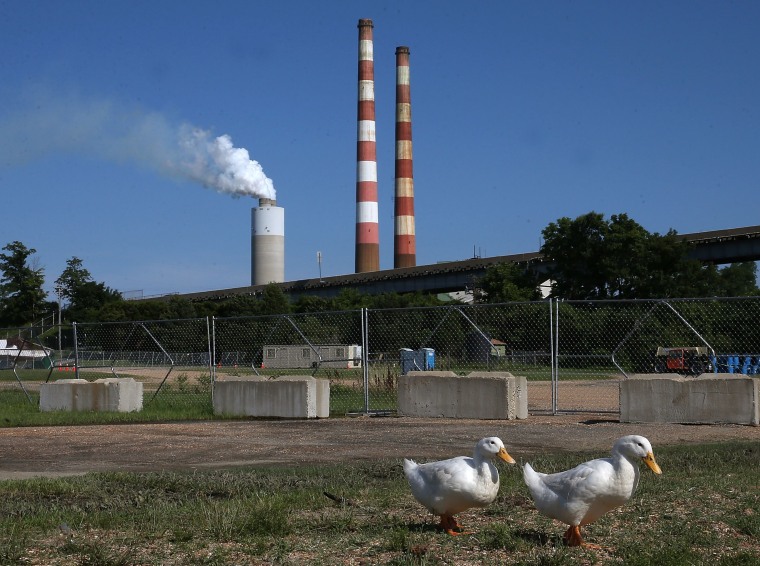Now that President Barack Obama has finalized new rules on coal-fired power plant emissions, states must put together plans to comply must work with low-income and minority communities in coming up with those plans. The administration expects minorities, vulnerable populations and elderly Americans to be targeted with opposition to the new rule. Obama said to opponents when he unveiled the rule, "If you care about low-income minority communities, start protecting the air that they breathe."
Nicole Hernandez Hammer, a biologist with expertise on rising sea levels and their impact on urban and natural systems, has studied the impact of climate change on Latinos. She left academic research to inform Latinos on her findings and help the community influence policy decisions on climate change. She does her outreach through Moms Clean Air Force, a group that works to reduce carbon dioxide emissions and other pollutants. Hernandez Hammer spoke to NBC News Latino about the administration’s plant emissions rule and why it matters.
NBC: What is the big announcement on plant emissions from the president?
Hernandez Hammer: The White House is releasing a Clean Power Plan that will start moving the U.S. toward a clean energy economy - it's the first ever restriction on carbon emissions. We’ve had other restrictions - but we haven’t had any on carbon emissions and this is a huge step in limiting carbon pollution. (Carbon dioxide is the primary greenhouse gas contributing to climate change.) The goal is that by 2030, the U.S. would reduce carbon emissions from coal-fired plants by 32 percent. It’s not only good for the U.S. but also, in terms of our position in the world, it allows us to be leaders in encouraging other countries to take more steps toward clean energy.
NBC: So what are you talking about when you talk about “coal-fired plants?”
Hernandez Hammer: These are places where coal is used to produce electricity. Coal generates 44 percent of our electricity. We use it in our home, for businesses, for industry … It’s the most carbon intensive way of creating electricity. You plug your socket it in the wall and there it is. There’s a whole system that produces that type of energy.
NBC: Why is this something you think Latinos should pay attention to?
Hernandez Hammer: We are 60 percent more likely to visit the hospital for asthma because we are disproportionately more vulnerable. Latino children are 40 percent more likely to die from asthma. A rule that reduces the effects of pollution and works toward mitigating the impact of climate change is especially important and valuable to Latinos for the health of our community in the short term, but in the longer term, it will help us avoid the worst impact of climate change. One of every two Latinos lives in an area where clean air rules are violated.
NBC: So how do people have a say in how these rules are put into place in their community?
Hernandez Hammer: Just putting out this rule isn’t the end. What’s important is to let officials know in your state what we want them to do going forward in meeting these rules. We want them to act on these rules. The new rules gives them an additional two years … until 2022 for states to meet the targets. State targets are going to vary .. There’s lots of flexibility for states to meet the rules. For me in Florida, solar is important. Our state is third in solar potential, but only 13th in production. There’s a lot of opportunity … that we haven’t leveraged and this plan is going to help us do that. In Florida, there is a ballot initiative for moving toward making solar more accessible and people can go to the website, www.flsolarchoice.org, and sign the petition.
NBC: What about opposition to the rule and the arguments that climate change isn’t real or caused by human activity?.
Hernandez Hammer: I don’t get that question a lot from Latinos, especially here in Florida because we are dealing with the impact of climate change now. The city of Miami is spending $500 million to deal with sunny day flooding … our insurance rates are going up. We are feeling the impact, not just seeing things happen but seeing how it impacts our personal budgets … It is happening and it is caused by human activity and we are in a position to take action, but that window is closing. If we don’t take decisive action, our children are going to see the impact of that and we have a moral obligation to make sure that doesn’t happen.

